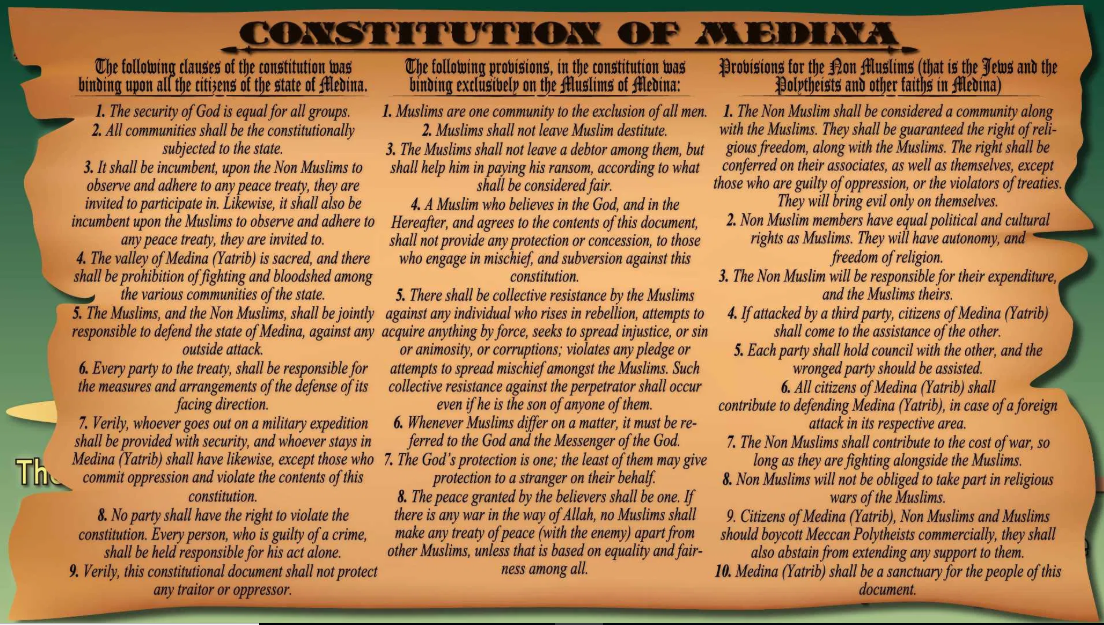 Constitution of Madinah It is commonly known that the document called Magna Carter also called the 'Great Charter', was the first ever multiparty charter of rights in which all communities part of the agreement were entitled to social, judicial and religious rights. This charter was agreed upon between King John of England of (12th century CE) and the rebellious tribes. In the Western academic circles this document is called 'one of the greatest charters of all times' and considered as the basis of all constitutions of modern nation states. However what is not commonly known is the fact that Mithaq al-Madinah or the Constitution of Madinah, preceded the Magna Carter by several centuries. In fact it would be correct to say that the first person to have ever created charter of rights that functioned as a constitution of a multi ethnic and multi religious society was Prophet Muhammad ﷺ. This charter of Madinah was brought to the modern world's attention by the famous Western Islamic scholar and polymath named Dr. Hamidullah in his article published in 1969 called "The First Written Constitution in the World: An Important Document of the Time of the Holy Prophet." The noted Islamic scholar and jurist Dr Muhammad Tahir-ul-Qadri analysed the constitution from earlier Islamic sources and divided it into 63 constitutional articles which is available online for free. Madinah was a town which was not ruled by a single tribe. All tribes laid claim to it which often caused them to be at war with each other. The Aws and Khazraj, two major pagan tribes were sometimes at peace and other times at war. These two tribes had allies from among the three main Jewish tribes of Banu Qurayza, Banu Nadir and Banu Qaynuqa who also took part in their conflicts. Madinah was a place where no majority or a king ruled them all and so such a setting gave an excellent opportunity to Prophet Muhammad ﷺ for implementation of a pluralist charter giving all parties equal rights thus eventually ceasing warfare. One of the primary reasons that members of Aws and Khazraj, visited Makkah during the annual gathering (Hajj in Makkah) was to invite Prophet Muhammad ﷺ to Yathrib (former name of Madinah), to act as a chief arbitrator and help them find a political solution to their never-ending conflict. The constitution helped secure an agreement among different communities ensuring safety and security of their lives and properties. This was a first form of a charter in humankind’s history that defined how a plural society was to function. It helped gain mutual trust of all the parties involved because it bound them to the terms and conditions of the charter. Anyone of the communities or their individual members reneging on any of its terms was liable for consequences and this was the only way to secure each other’s allegiance so that all citizens remained safe. The constitution was not a divine injunction given by Allah ﷻ to the Prophet ﷺ to deliver to humankind even though humanity has benefited from this prophetic wisdom. In fact it would be correct to claim that this constitution may have played the role of inspiring great minds throughout the history, and became the basis of the modern system of governance called 'democracy', a democratic form of a government. This system of governance that majority nation states follow today is based on a constitution which claims that all citizens have equal rights regardless of race, ethnicity and religion supervised by a judicial system. Likewise, the state of Madinah was a like a modern nation state with Prophet Muhammad ﷺ as its head of state ruled by a constitution that provided equal rights to all communities. We can also say that the Madinah constitution was similar to a modern secular constitutions, in the sense that not all parties involved followed same religion. However, many of its injunctions clearly mention the sovereignty of Allah and Prophet's messengership that all parties accepted. The agreement was mainly between three parties: The muhajireen (emigrants), early Muslims who emigrated to Madinah, the ansaar (helpers), new Muslim converts in Madinah, all Jewish tribes and their allies.
0 Comments
Leave a Reply. |
AuthorZaid Shaw Archives
September 2019
Categories |
Proudly powered by Weebly
 RSS Feed
RSS Feed